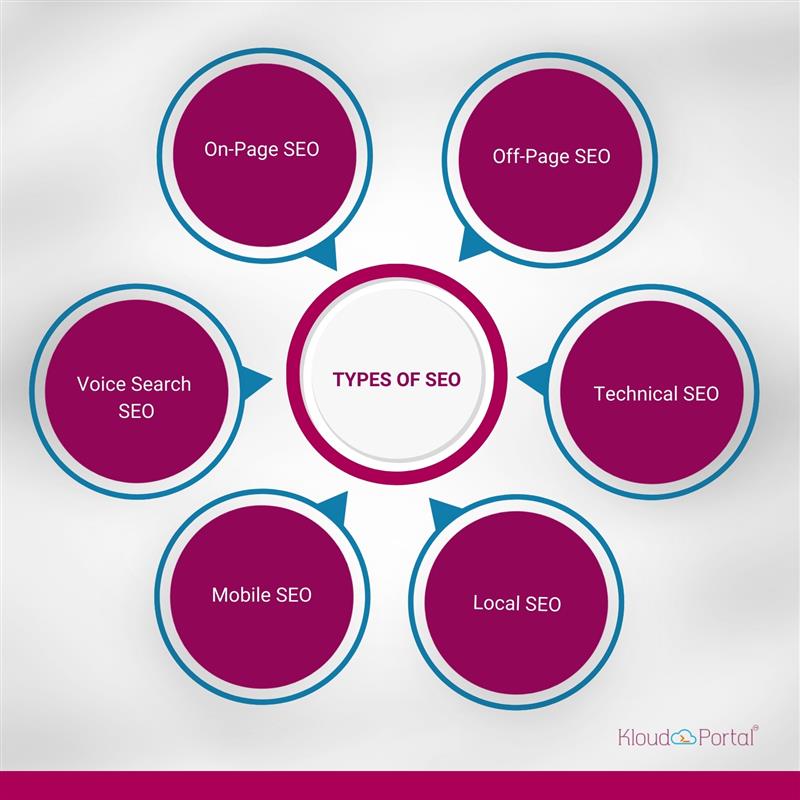What We Cover In This Blog?
All About 67 Types Of SEO
- On-Page SEO – Optimizing elements within your website’s pages, such as content, code, and structure, to enhance search engine understanding and relevance.
- Off-Page SEO – Off-page SEO focuses on activities outside your website that impact your rankings. It includes building backlinks, social media advertising, and influencer collaborations to increase your site’s authority.
- Technical SEO – Technical SEO encompasses refining the technical aspects of a website to guarantee efficient crawling, indexing, and comprehension by search engines of the presented content.
- Local SEO – Local SEO targets local search results and aims to increase visibility for businesses serving specific geographic areas. It involves optimizing Google My Business profiles, local citations, and encouraging customer reviews.
- International SEO – For businesses targeting a global audience, international SEO is crucial. It involves content for different languages, using hreflang tags, and considering regional search engine optimization.
- Mobile SEO – Ensure your website is mobile-friendly for seamless performance on all devices, catering to the ever-growing mobile audience
- Voice Search SEO – With the rise of voice-activated devices, it is crucial to optimize content for voice search queries. It involves using natural language, providing concise answers, and optimizing for conversational search.
- E-commerce SEO – E-commerce SEO involves optimizing online stores for search engines, including product pages and images, and ensuring a smooth user experience during the shopping process.
- Video SEO – Given the widespread popularity of video content, video marketing SEO focuses on optimizing videos for search engines. It includes using descriptive titles, relevant tags, and providing transcripts to increase organic traffic.
- Image SEO – Enhancing user experience and visibility relies heavily on optimizing images for search engines. This process includes employing descriptive filenames, adding alt text, and compressing images to ensure swift loading times.
- App Store Optimization (ASO) – ASO plays a crucial role in the realm of mobile apps, necessitating the optimization of app titles, descriptions, and relevant keywords to enhance visibility within app store search results.
- Social Media SEO – Social media signals can impact search rankings. Social Media SEO involves optimizing your social profiles, sharing content across platforms, and engaging with your audience.
- Brand SEO – Building a strong online brand presence can positively impact SEO. It involves creating a consistent brand image, gaining brand mentions, and managing online reputation.For businesses seeking unparalleled online visibility and strategic optimization, our agency offers the Best Enterprise SEO services in India, ensuring top-notch solutions tailored for large-scale success
- PR (Public Relations) SEO – Public relations efforts can contribute to SEO by earning high-quality backlinks and enhancing brand visibility.
- Schema Markup – Utilizing schema markup aids search engines in comprehending the context of your content, thereby enhancing the presentation of rich snippets in search results.
- Rich Snippets – Enriching search offers supplementary information that renders your listing more appealing and informative.
- Accelerated Mobile Pages (AMP) – AMP is a Google-backed project that creates faster-loading mobile pages, positively impacting mobile SEO.
- Breadcrumb Navigation – Breadcrumb navigation enhances user experience and helps search engines understand the site’s structure.
- Canonical Tags – Canonical tags play a role in averting problems related to duplicate content by indicating the preferred version of a page.
- 301 Redirects – Redirects are crucial for preserving SEO value when changing URLs or consolidating pages.
- 404 Error Page Optimization – Customize 404 error pages for a better user experience and prevent negative SEO impact.
- Keyword Research SEO – Thoroughly researching keywords is essential for identifying pertinent terms and phrases to optimize content. Being a Top Digital Marketing Company in India, we utilize state-of-the-art approaches, incorporating inventive applications of ChatGPT, to boost your online visibility and provide outstanding outcomes in the ever-evolving social media marketing strategy.
- Long-Tail SEO – Targeting longer, specific keyword phrases to attract a more targeted audience.
- Latent Semantic Indexing (LSI) – Using related keywords to improve content relevance and search engine understanding.
- User Experience (UX) SEO – Optimizing website design and navigation for a positive user experience.
- Page Load Time Optimization – Enhancing site speed to improve user experience and search engine rankings.
- Link Building – Building high-quality backlinks to improve authority and rankings.
- Link Juice – Understanding and optimizing the flow of authority through external and internal links.
- Link Earning – Focusing on creating valuable content to attract backlinks naturally.
- Broken Link Building – Identify and replace broken links with your content for link acquisition opportunities.
- Competitor Analysis SEO – Analyzing competitor strategies to identify opportunities and gaps in your SEO approach.
- Content Gap Analysis – Identifying content gaps in your industry and creating content to fill those voids.
- Content Quality SEO – Prioritizing high-quality, relevant content for better search engine rankings.
- Duplicate Content Management – Preventing and managing duplicate content issues for improved SEO.
- Google Analytics Setup – Implementing Google Website Analytics to track and analyze website performance.

- Google Search Console Setup – Utilizing Google Site Console to monitor and improve website presence in search results.
- User Intent Optimization – Aligning content with user intent to provide more relevant results.
- Featured Snippets Optimization – Organizing content to enhance the likelihood of being featured in snippets in search results.
- Local Citations – Building consistent business citations to improve local search rankings.
- Google Maps Optimization – Optimizing Google Maps listings for local businesses.
- Knowledge Graph Optimization – Structuring content to enhance the likelihood of appearing in Google’s Knowledge Graph.
- Entity SEO – Focusing on building authority around specific entities to improve search visibility.
- User-Generated Content (UGC) SEO – Leveraging user-generated content to enhance engagement and search engine rankings.
- Social Proof SEO – Utilizing social proof, which incorporates testimonials and reviews, to instill a sense of trust and credibility.
- Google My Business Posts – Utilizing Google My Business posts to engage with the local audience and improve rankings.
- Transactional SEO – Optimizing for transactional queries to drive conversions and sales.
- SERP Features Optimization – Tailoring content to appear in various SERP features like snippets, carousels, and knowledge panels.
- Influencer SEO – Engaging with influencers to enhance brand visibility and acquire authoritative backlinks.
- Podcast SEO – Optimizing podcast content for search engines to attract a wider audience.
- Guest Posting for SEO – Distributing content across external platforms to cultivate backlinks and broaden audience reach.
- Brand Mentions SEO – Monitoring and leveraging brand mentions for SEO and online reputation management.
- User-Intent Optimization – Aligning content with the specific intent of users to enhance relevance.
- User Retention SEO – Implementing strategies to retain users and reduce bounce rates for improved rankings.
- Customer Reviews and Ratings SEO – Encouraging and managing customer reviews for enhanced online visibility.
- Inbound Marketing SEO – Integrating SEO strategies into inbound marketing efforts for a holistic approach.
- Social Signals – Regard social media engagement as a factor influencing rankings and optimize strategies accordingly.
- Niche SEO – Tailoring SEO strategies to specific niches for targeted audience reach.
- Brand Identity SEO – Incorporating brand identity elements into SEO strategies for brand recognition.
- Exit Intent Optimization – Implementing strategies to retain users who are about to leave the website.
- Brand Ambassador SEO – Brand ambassadors boost brand visibility while partnering with an Enterprise SEO Agency empowers large businesses to enhance online visibility, optimize web pages effectively, and stay competitive in the digital landscape.
- Content Diversification SEO – Diversify content types, such as text, images, videos, and infographics, to cater to various audience preferences.
- Evergreen Content Optimization – Updating and optimizing evergreen content to maintain relevance and search visibility over time.
- Mobile-First Indexing – Adjusting to Google’s mobile-first indexing, prioritizing the ranking of mobile versions of websites in search results.
- Vertical SEO – Tailoring SEO strategies for specific industry verticals to address unique challenges and opportunities.
- Local Link Building – Building location-specific backlinks to boost local search rankings.
- Pinterest SEO – Optimizing content for Pinterest search to tap into the platform’s visual discovery audience.
- Twitter SEO – Leveraging SEO strategies on Twitter to improve tweet visibility in search results.
Conclusion
Implementing a comprehensive SEO strategy involves optimizing meta tags and site structure, utilizing long-tail keywords, and incorporating a robust content marketing strategy. This ensures improved Google rankings, higher organic traffic, and enhanced brand visibility on SERP rankings through guest blogging, all aligned with search intent and catering to specific search volumes, ultimately contributing the overall success of your own website and the effectiveness of your SEO initiatives. Understanding and implementing the 67 types of SEO discussed in this guide will empower businesses to succeed in the competitive online marketing team.
Rasmita Patro
About The Author…
Meet Rasmita Patro, a content writer, a former teacher, and a former HR with a passion for storytelling, creating compelling content that engages and informs readers. She has a Master’s in Economics and an MBA degree in Human Resources. Her expertise spans a variety of industries, including finance, healthcare, technology, and others. She has a particular inclination toward crafting blog posts, articles, and social media content that resonates with the target audience. She loves reading different genres of books, love to experiment with cooking, and listening to soothing music.

